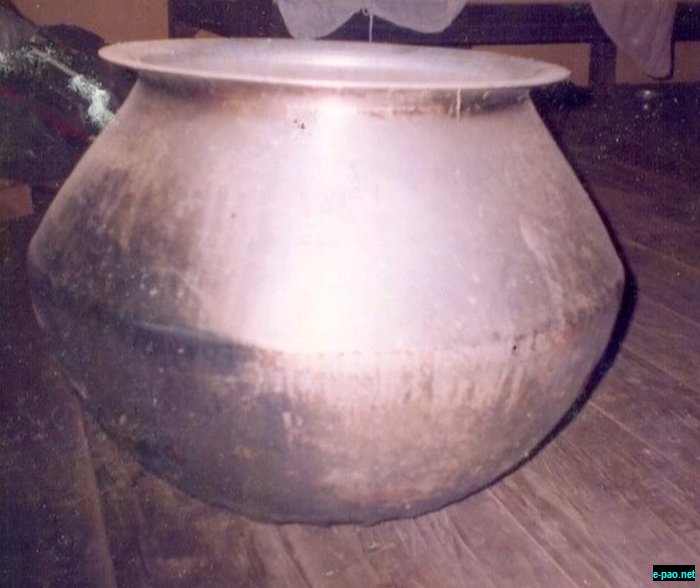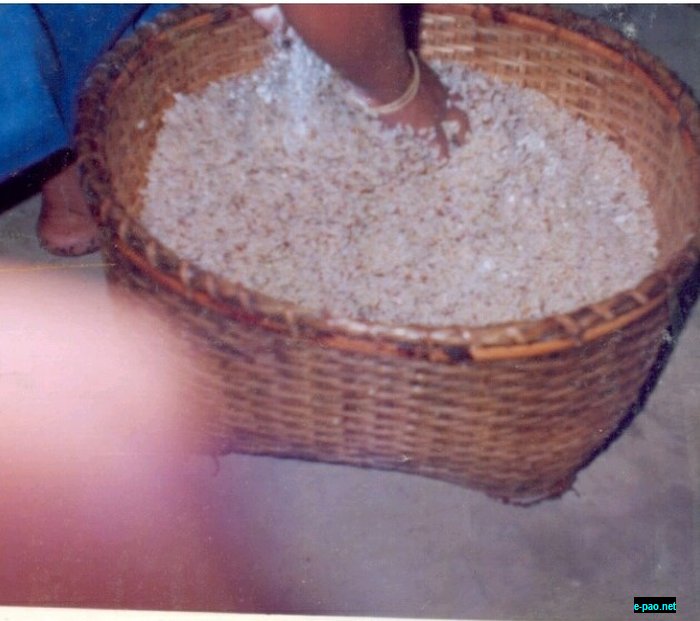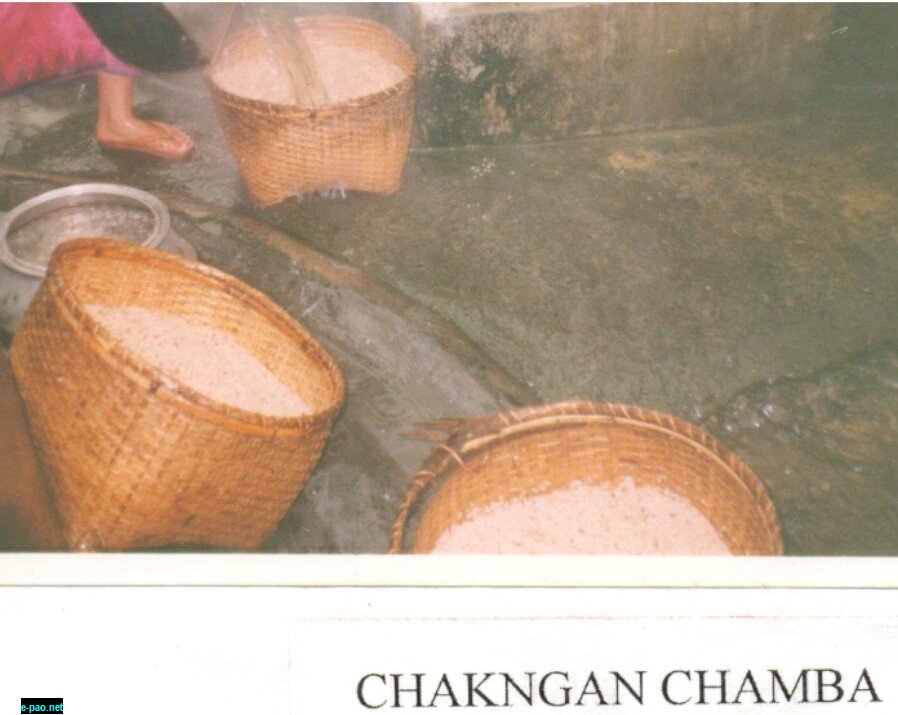Traditional Knowledge System of Distilling Alcoholic Rice Beverage among The Loi People of Awang Sekmai, Manipur
- Part 2 -
Prof. S. Mangi Singh / Dr. Ayangbam Shyamkishor *

Yuphu :: System of Distilling Alcoholic Rice Beverage among The Loi People of Awang Sekmai
The yuphu containing the mixture of khajee, kharee and water is covered properly by a yumai. This yumai is usually made of an aluminum plate with numerous holes all over the surface. Above it, a thin cloth is again placed. The purpose of the numerous holes in the plate is to ventilate the steam which will come up once the mixture is boiled. This yumai, along with the cloth also blocks solid particles from coming up.
Above the yumai, the yukok is placed. The yukok is an apparatus, the bottom of which is hollow. Inside it, a tin sheet which surface is slightly curved and slanting upwards is inserted so that the distilled liquid may fall on it and also flow out over it. The upper surface of the yukok also has a large and circular opening.
Over it, a pot which is full of cold water is kept. The entire process is completed in the evening of the third and fourth day during summer and winter respectively. The tin sheet is extended outside the yukok in the form of a hollow tube which is again connected to an aluminum or plastic pipe. And at the other end of the pipe, the yu-ya poon, a pot or plastic bucket for collecting the distilled yu, is placed.
Finally in the morning of the fourth or the fifth day as case might be, fire will be made beneath the yuphu to start the process of heating. In the beginning, heat is given as much as possible till the mixture inside the yuphu starts boiling. Once it starts boiling, the heat given is not only reduced but the level of the heat given is also uniformly maintained.
The steam will start coming up to the yukok after passing through the yumai. Then, after coming into contact with the cold bottom of the pot with cold water above the yukok, it starts condensing. After a while, the condensed liquid will start dripping down drop by drop from the bottom of the pot on the slightly curved surface of the tin sheet. Then it will come out and, after passing through the aluminum or plastic pipe, gets collected inside the yu-ya poon drop by drop.
The liquid so collected is the yu or Alcoholic Rice Beverage which is distilled. It must be noted that the water inside the pot on top of the yukok is changed every now and then with cold water so as to keep it cold all the time. The entire process of distillation continues for about five hours. After that it has to be closely monitored whether the process should be stopped or not.

Chakngan mixed with Hamei :: System of Distilling Alcoholic Rice Beverage among The Loi People of Awang Sekmai
To examine it some of the Alcoholic Rice Beverage already collected is taken out. Then it is poured down into another container like a glass. If one notices bubbles coming up from the Alcoholic Rice Beverage inside the glass, the process is stopped. The Alcoholic Rice Beverage inside the yu-ya poon shall be removed and keep in a container. Now the process of distilling the Alcoholic Rice Beverage is over and the Alcoholic Rice Beverage is ready for consumption. The final step of taking out the distilled yu from the yu-ya poon is called yu kaiba.
Basing on its quality, the Alcoholic Rice Beverage produced by the people of Sekmai is classified into three classes viz. yu machin, yu aphaba and yu awouba. Yu machin is also simply known as machin. It is the best of the three and the percentage of alcohol is believed to be highest here.
It is also very costly when compared to the price of the other two classes of Alcoholic Rice Beverage. Sometimes, its price is six or seven times higher than that of the others. This is mainly because of the fact that normally 12 to 15 liters of Alcoholic Rice Beverage is brewed from the Khajee prepared from 20 kg of rice.
But if a person wants machin, then only the first two or three liters have to be collected and the process of distillation is stopped. Because unless collected with he first 2/3 liters, the rest of the distillate will be useless as Alcoholic Rice Beverage. Machin is also used sometimes as medicine. People apply it to get relief from pains in the body or body joints. Women also believe that applying it can remove pimples.
Yu aphaba, the second type of Alcoholic Rice Beverage is also simply known as yu. Its quality is more than yu awaoba but less than that of machin. Yu awaoba, the third kind of Alcoholic Rice Beverage, is the Alcoholic Rice Beverage which is collected after the mixture is overcooked.
In addition to these three kinds of Alcoholic Rice Beverage, there are another two kinds of Alcoholic Rice Beverage. These two are mainly characterized by their distinctive smells. But they are also the products of the same distilling process. These two are yu ashinba or sour Alcoholic Rice Beverage and yu akaba or burnt up Alcoholic Rice Beverage.
While the yu asinba smells sour, yu akaba smacks of a burning smell. If the quality of the hamei is bad, it adversely affects the fermentation process which in turn gives the Alcoholic Rice Beverage a sour taste. On the other hand, yu akaba is mainly the result of three things. Sometimes, proper fermentation of the khajee might not have taken place. In addition to that the amount of water added with the khajee and khari inside the yuphu may be less than the required proportion.
When these two things happen, yu akaba is produced. It may also be the result of excess heat given to the yuphu. Because it leads to the burning up of the khajee inside the yuphu which in turn give the smell of burning to the Alcoholic Rice Beverage. It may also be mentioned here that yu akaba is also considered to be a good quality Alcoholic Rice Beverage. The only thing is that it has got an unwholesome smell.

Chakngan Chamba :: System of Distilling Alcoholic Rice Beverage among The Loi People of Awang Sekmai
Distillation of Alcoholic Rice Beverage and the economic life of the people:
In Manipur, there are other Loi villages and tribal villages which distill Alcoholic Rice Beverage. But the quality of the Alcoholic Rice Beverage produced by the people of Sekmai is acknowledged as the best throughout the state. This is believed to be mainly because of the superior quality of rice which the people of Sekmai use for preparing the Alcoholic Rice Beverage. They never use cheaper or low quality rice for the purpose.
Moreover, the proportion of Alcoholic Rice Beverage extracted by distillation is much less in Sekmai when compared to other places. This helps them in maintaining the high level quality of their product. For instance, here, they produce only about 12 to 15 liters of Alcoholic Rice Beverage from 20 kg of good quality rice.
But in Phayeng and Andro, two other Loi villages of Manipur, the people produced as much as 10 liters of Alcoholic Rice Beverage from 10 kg of rice. The quality of rice is also low there. As a result, the Alcoholic Rice Beverage manufactured in Sekmai is the most coveted one not only in Manipur but even in the neighboring states it is very popular and is known by the name Sekmai to distinguish it from the Alcoholic Rice Beverages produced in other places.
The age old occupation of Alcoholic Rice Beverage distillation among the people of Sekmai is a very lucrative one. In fact, along with agriculture, it is the main source of income for the people there. Almost every household of Sekmai produces it or is engaged in the Alcoholic Rice Beverage business in one way or the other. In short, the economy of the village largely centers round the production of it.
For the individual family, it is not only a major source of family income but also an enterprise which helps them to take up other important and related income generating enterprises. For instance, most of the households in Sekmai are also engaged in piggery and it is very successful there. The leftover of the khajee after distillation or yupang as it is called, are very good for feeding the pigs. In fact it is popularly called ok-chak, meaning food for pigs.
As the people engage themselves in Alcoholic Rice Beverage preparation throughout the year, there is no dearth of food for the pigs. As a result piggery is also an ever flourishing economic enterprise in the village. And the income so generated supplements the family income very well. This further brings another benefit to the people.
The stools of the pigs are properly collected and used for producing bio-gas which is a great money saver. Many families in the village successfully use the bio-gas generated from pig stools for cooking and other purposes. Thus the Alcoholic Rice Beverage distillation is not only a major source of income for the people of Sekmai but it also supports other economic enterprises.
It may also be noted here that as the distillation takes place throughout the year, the people of Sekmai take due care that they have supply of rice throughout the year. Usually they use the paddy collected from their fields after leaving aside a certain portion of it for their own annual consumption. Still the paddy produced from their fields is not enough to last throughout the year.
Therefore, many people, especially women from the neighboring villages will supply good quality rice to Sekmai thereby increasing economic activity of the village further. Even people from other districts of Manipur are engaged in supplying the rice to Sekmai.
(Concluded .....)
* Prof. S. Mangi Singh / Dr. Ayangbam Shyamkishor wrote this article as part of Seminar proceedings at Centre for Manipur Studies, Manipur University.
Prof. S. Mangi Singh is at Political Science Dept., Manipur University and Dr. Ayangbam Shyamkishor is Asst. Professor, Political Science Dept., Mizoram University
This article was forwarded by Aheibam Koireng Singh who can be contacted at akoireng(AT)gmail(DOT)com
This article was posted on June 20, 2017.
* Comments posted by users in this discussion thread and other parts of this site are opinions of the individuals posting them (whose user ID is displayed alongside) and not the views of e-pao.net. We strongly recommend that users exercise responsibility, sensitivity and caution over language while writing your opinions which will be seen and read by other users. Please read a complete Guideline on using comments on this website.








